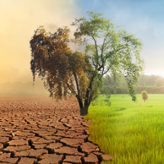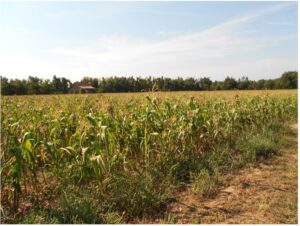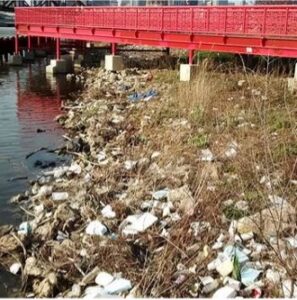
What is happening to our common home?
In this third week of June, the Saint Anne Creation Care Committee begins its highlights of Chapter 1 of “Laudato Si’: On Care for Our Common Home” with the hope that parishioners will be inspired to read (or reread) Pope Francis’ groundbreaking Encyclical.
The opening paragraphs present the most recent scientific findings on the environment as a way to listen to the cry of creation, “to become painfully aware, to dare to turn what is happening to the world into our own personal suffering and thus to discover what each of us can do about it” (#19). It thus deals with “several aspects of the present ecological crisis” (@15). This week we focus on the first three signs of planetary degradation–issues that are in urgent need of analysis:
1. The first issue deals with pollution and climate change (#20-26).
A) POLLUTION
Many types of pollution are leading to a broad spectrum of health hazards, especially for the poor (#20). Pope Francis points to the hundreds of millions of tons of waste generated every year, much of it toxic, radioactive, and non-biodegradable. Because of it, the earth, our home, is beginning to look more and more like an immense pile of filth (#21). These problems are closely related to the throwaway culture in which we live which affects the excluded while reducing things to rubbish; we must learn to preserve resources for present and future generations, while limiting as much as possible the use of non-renewable resources(#22).
B) CLIMATE CHANGE
Regarding climate change, the Pope states that a very solid scientific consensus indicates that we are presently witnessing a disturbing warming of the climate system. While other factors are involved, studies indicate that most global warming in recent decades is due mainly to human activity, and the problem is aggravated by a model of development based on the intensive use of fossil fuels.

“Climate change is a global problem with serious implications, environmental, social, economic, political and for the distribution of goods; it represents one of the principal challenges facing humanity in our day” (#25). If “the climate is a common good, belonging to all and meant for all” (#23), the greatest impact of this change falls on the poorest (#26) many of whom live in areas particularly affected by phenomena related to warming, and this has led to a tragic rise in the number of migrants seeking to flee the growing poverty caused by environmental degradation.
“Many of those who possess more resources and economic or political power seem mostly to be concerned with masking the problems or concealing their symptoms” (#26). At the same time, “our lack of response to these tragedies involving our brothers and sisters point to the loss of that sense of responsibility for our fellow men and women upon which all civil society is founded” (#25).
Humanity is called to recognize the need for changes of lifestyle, production, and consumption, and to promote effective policies to address these issues (#23-26).

2. The second issue addressed in Chapter 1 is that of water (#27-31).
Fresh drinking water is an issue of primary importance, since it is indispensable for human life and for supporting terrestrial and aquatic ecosystems; the situation is particularly serious in relation to the poor, causing many deaths and the spread of water-related diseases (#28-29). The encyclical is clear in stating that “access to safe drinking water is a basic and universal human right since it is essential to human survival and, as such, is a condition for the exercise of other human rights” (#30). To deprive the poor of access to water means to deny “the right to a life consistent with their inalienable dignity” (#30).
3. The third area deals with loss of biodiversity (#32-42).
“Each year sees the disappearance of thousands of plant and animal species which we will never know, which our children will never see, because they have been lost forever” (#33). Extinction of plant and animal species, caused by humans, changes the ecosystem; future consequences cannot be predicted. This loss entails not only the elimination of resources for us, but the disappearance of species that have value in themselves (#32-33). They are not just any exploitable “resource” but have a value in and of themselves. In this perspective “we must be grateful for the praiseworthy efforts being made by scientists and engineers dedicated to finding solutions to man-made problems”, but when human intervention is at the service of finance and consumerism, “it is actually making our earth less rich and beautiful, ever more limited and greyer” (#34).
We must recognize the fact that ALL creatures are connected, and that all are dependent on one another (#42).
Questions for Reflection
- Do you agree with the Pope that the Earth, our common home, is falling into serious disrepair? What evidence can you provide to support your opinion?
- Over the last few years there has been contention over the causes of global warming. The Pope says that while there are other causes, the main one is human activity. What do you think? What can we do in our personal, communal, and social lives to address the causes of climate change?
